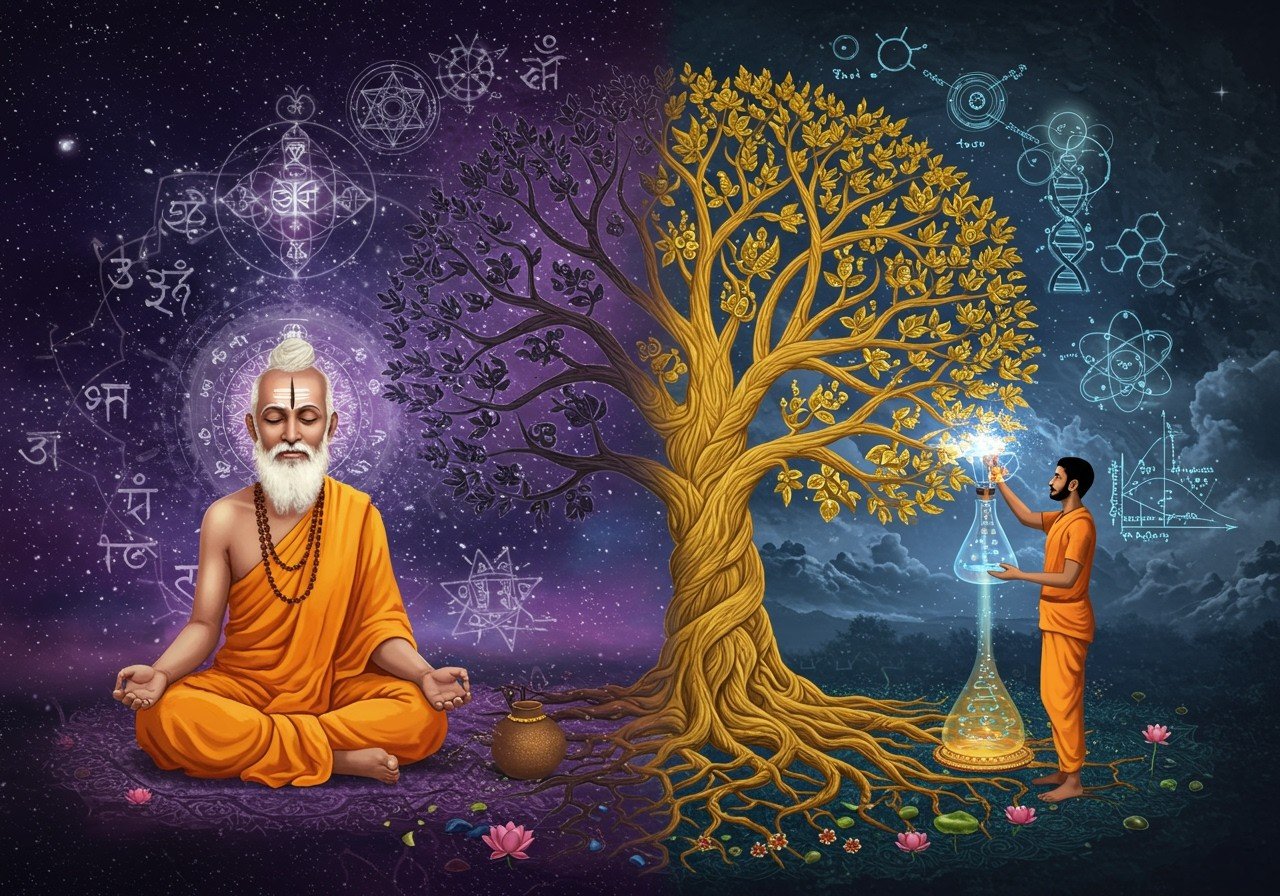
Jnana Yoga and Jnana Vijnana Yoga are profound spiritual paths emphasizing knowledge and wisdom within Indian philosophy. These practices empower individuals to integrate ancient wisdom into their modern lives. They focus on understanding the self and the universe, bridging the gap between traditional teachings and contemporary experiences.
Understanding Jnana Yoga
Jnana Yoga: The Path of Knowledge
Jnana Yoga, rooted in ancient texts like the Upanishads and the Bhagavad Gita, is a pursuit of true wisdom through knowledge. It emphasizes self-inquiry (Atma Vichara) as a means to achieve self-realization. Discernment (Viveka) and dispassion (Vairagya) are key aspects for practitioners on this journey, along with understanding the concept of Maya, or illusion.
- Self-Inquiry (Atma Vichara): This involves a deep exploration of one’s true nature, going beyond superficial identities and beliefs. It’s a process of questioning and contemplation to uncover the essence of the self.
- Discernment (Viveka): Discernment cultivates the ability to differentiate between the real and the unreal, the permanent and the impermanent. It helps practitioners distinguish between the true self and the illusions of the ego.
- Dispassion (Vairagya): Dispassion involves gradually detaching from worldly desires and attachments. This doesn’t mean renouncing the world, but rather shifting one’s focus from external pursuits to inner peace and contentment.
The ultimate goal of Jnana Yoga is Moksha, liberation from the cycle of birth and death, achieved through the realization of oneness with universal consciousness. Meditation and contemplation are central practices, guiding seekers toward transcending the limitations of ego and illusion.
Introducing Jnana Vijnana Yoga
Jnana Vijnana Yoga: A Holistic Approach
Jnana Vijnana Yoga blends knowledge with experiential wisdom, complementing traditional Jnana Yoga. It has emerged within contemporary spiritual discourse. It integrates intellectual understanding with direct, personal experience, emphasizing intuition and inner guidance.
- Direct Experience: Jnana Vijnana Yoga emphasizes personal realization of spiritual truths, moving beyond theoretical knowledge to embodied understanding. This direct experience validates and deepens intellectual learning.
- Intuition: Cultivating intuition, or inner guidance, plays a significant role in Jnana Vijnana Yoga. It encourages practitioners to trust their inner wisdom and access deeper levels of understanding beyond the rational mind.
- Practical Application: This path emphasizes the practical application of Jnana, integrating spiritual principles into daily life. It encourages living in alignment with one’s highest understanding and embodying wisdom in actions and relationships.
Jnana Vijnana Yoga offers tools for self-awareness and transformation, addressing the challenges of modern life. It bridges the gap between intellectual knowledge and spiritual insight, fostering personal growth and well-being.
Comparative Analysis: Jnana Yoga vs. Jnana Vijnana Yoga
While both paths emphasize knowledge and wisdom, their approaches differ. Jnana Yoga centers on scriptural study and philosophical inquiry, while Jnana Vijnana Yoga prioritizes experiential realization through practices like meditation and mindfulness.
- Scriptural Study vs. Experience: Jnana Yoga relies heavily on the study of sacred texts and philosophical analysis. Jnana Vijnana Yoga values these, but it prioritizes direct personal experience as the primary source of wisdom.
- Knowledge vs. Realization: Jnana Yoga focuses on acquiring knowledge, while Jnana Vijnana Yoga emphasizes the realization and embodiment of that knowledge. It’s the difference between knowing something intellectually and living it fully.
- Ego and Illusion: Both paths address the concepts of ego and illusion, but with different methods. Jnana Yoga uses intellectual inquiry to dismantle false beliefs, while Jnana Vijnana Yoga uses experiential practices to transcend the limitations of the ego.
Both paths offer unique insights for spiritual growth. Practitioners may integrate both for a comprehensive journey, tailoring their approach to individual preferences and life circumstances.
Jnana Vijnana Yoga in Chapter 7 of the Bhagavad Gita
Chapter 7 of the Bhagavad Gita delves into the principles of Jnana Vijnana Yoga. Krishna elucidates the nature of divine wisdom, highlighting the interplay between Jnana (knowledge) and Vijnana (realized wisdom). Key verses within this chapter provide guidance for those seeking deeper understanding.
- Divine Wisdom: This refers to understanding the true nature of the Supreme Self, Brahman, and the relationship between the individual self (Atman) and the universal consciousness. It involves recognizing the divine within and all around us.
- Realized Wisdom: Realized wisdom, Vijnana, is the direct perception of the Supreme Self through deep meditative states (Samadhi). It’s not just intellectual knowledge but a direct, experiential knowing of the ultimate reality.
The teachings in Chapter 7 offer practical applications for modern life, providing valuable insights into cultivating spiritual understanding.
Practical Applications and Benefits
Both Jnana Yoga and Jnana Vijnana Yoga offer practical benefits for daily life, enhancing mental clarity, emotional stability, and spiritual awareness. Combining these with practices like Karma Yoga (selfless service) and Bhakti Yoga (devotion) can further enrich one’s spiritual routine. Bhakti Yoga complements these paths beautifully.
- Meditation: Regular meditation cultivates self-awareness, allowing you to observe thoughts and emotions without judgment. This practice enhances focus, reduces stress, and promotes inner peace.
- Mindfulness: Practicing mindfulness brings awareness to the present moment, enriching everyday experiences. It cultivates appreciation for the simple things and reduces reactivity to challenging situations.
- Self-Reflection: Engaging in self-reflection deepens self-understanding, uncovering limiting beliefs and patterns. This process facilitates personal growth and transformation, allowing you to live more authentically.
These practices foster a deeper connection with oneself and the universe, providing tools for personal transformation.
How Poojn.in Supports Your Jnana Yoga Practice
Poojn.in provides a wide selection of items to support your Jnana Yoga and Jnana Vijnana Yoga practice:
Sacred Texts and Books
- The Bhagavad Gita with detailed commentaries: Discover different editions and translations.
- Upanishads in Sanskrit with translations: Explore authentic versions of these core texts.
- Vedanta philosophy texts: Deepen your understanding of Vedantic thought.
Study Materials
- Traditional wooden book stands (path): Enhance your study experience with these beautiful and functional stands.
- Pure copper water vessels for meditation: Benefit from the positive energetic properties of copper.
- Cotton asanas for comfortable sitting: Maintain comfortable posture during extended study and meditation.
Meditation Supplies
- Brass oil lamps for focused study: Create a sacred atmosphere conducive to concentration.
- Natural incense to create a peaceful environment: Enhance your meditation space with calming scents.
- Meditation cushions and mats: Support proper posture and comfort during meditation.
Contact us at 91 3369029784 for personalized guidance on selecting the appropriate items for your spiritual practice. All products are verified for authenticity and adhere to traditional specifications. We offer pan-India delivery with secure packaging to protect your sacred items during transit.
Visit www.poojn.in to explore our complete collection of items designed to support your spiritual study and practice.
Embracing the Journey
Jnana Yoga and Jnana Vijnana Yoga are akin to two rivers converging into the same ocean of wisdom. Each offers a distinct path to self-discovery and spiritual fulfillment. By understanding their unique qualities and strengths, you can choose the path that resonates most deeply with your heart and mind. These teachings, rooted in ancient tradition, provide invaluable guidance in our modern world. Embrace the journey with an open heart, allowing the wisdom of these practices to illuminate your path toward self-awareness and inner peace. May your spiritual journey be enriching and fulfilling, leading you to profound insights and a deeper connection with the divine.
FAQs on Jnana Yoga and Jnana Vijnana Yoga: A Clear Comparison
What is Jnana Yoga?
Jnana Yoga, the path of knowledge, involves self-inquiry and understanding the nature of reality through study, reflection, and meditation. It emphasizes gaining wisdom through intellectual understanding of spiritual truths.
What is Jnana Vijnana Yoga?
Jnana Vijnana Yoga combines knowledge (Jnana) with experiential wisdom (Vijnana). It goes beyond intellectual learning to emphasize direct experience and realization of spiritual truths in one’s life. It’s the practical application of Jnana through practices like meditation.
How do Jnana Yoga and Jnana Vijnana Yoga differ?
Jnana Yoga primarily focuses on intellectual understanding through scriptural study and philosophical inquiry. Jnana Vijnana Yoga integrates this intellectual understanding with direct personal experience, highlighting the importance of realizing those truths through practice.
Why is Chapter 7 important in Jnana Vijnana Yoga?
Chapter 7 of the Bhagavad Gita is a significant text for understanding Jnana Vijnana Yoga. It explores the relationship between Jnana and Vijnana, explaining how knowledge and experiential wisdom work together to achieve spiritual realization. Krishna teaches the nature of divine wisdom.
Can anyone practice Jnana Yoga and Jnana Vijnana Yoga?
Yes, anyone with a sincere interest in self-discovery and spiritual growth can practice both Jnana Yoga and Jnana Vijnana Yoga. Dedication, an open mind, and a willingness to learn and grow are essential.
What are the benefits of Jnana Vijnana Yoga?
Jnana Vijnana Yoga can bring about increased self-awareness, inner peace, and a deeper connection with the universe. It helps in understanding both the mind and the heart, leading to a more holistic and fulfilling life.
Is meditation a part of Jnana Yoga and Jnana Vijnana Yoga?
Yes, meditation is a core practice in both Jnana Yoga and Jnana Vijnana Yoga. In Jnana Yoga, it helps in contemplating and internalizing learned knowledge. In Jnana Vijnana Yoga, meditation facilitates direct experience and realization of spiritual truths.


